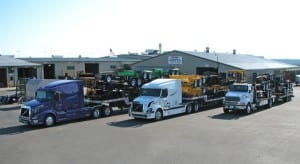Always read your Trailer’s Operators Manual before loading or towing your trailer. You can access Felling Trailers Operator’s Manuals here.
Two Key Measurements to Know for Trailer Safety
2. What is the weight of the equipment or materials you are hauling? Determine the weight on a certified scale or by referencing the equipment’s Owner’s Manual.
How you Load the Cargo Affects How the Trailer Pulls
Securing the Load with Binders, Straps, Chains
 There are several ways to secure your cargo. Types of cargo tie-down straps include Cam straps, over-center lever cam style straps, and ratchet straps. Felling Trailers include various tie-downs such as corner tie-downs, D-rings, or stake pockets. It is important to purchase high-quality tie-down straps and to inspect them before each use. When the webbing on your tie-down straps show any signs of wear or the hooks are bent, replace them. The moving parts on the ratchet strap mechanisms should also be periodically lubricated. Chains can also be used to secure equipment on the trailer. Again, be sure to inspect them before each use and don’t use them if they are showing any fatigue, such as cracks or stretches. Tie-down points, binders, hooks, chains, and clevis points should all meet capacity regulations and be inspected before each use.
There are several ways to secure your cargo. Types of cargo tie-down straps include Cam straps, over-center lever cam style straps, and ratchet straps. Felling Trailers include various tie-downs such as corner tie-downs, D-rings, or stake pockets. It is important to purchase high-quality tie-down straps and to inspect them before each use. When the webbing on your tie-down straps show any signs of wear or the hooks are bent, replace them. The moving parts on the ratchet strap mechanisms should also be periodically lubricated. Chains can also be used to secure equipment on the trailer. Again, be sure to inspect them before each use and don’t use them if they are showing any fatigue, such as cracks or stretches. Tie-down points, binders, hooks, chains, and clevis points should all meet capacity regulations and be inspected before each use.
Check your Load Often
To ensure safety throughout the time you are hauling the load on the trailer, periodically pull over and check to make sure everything is properly secured. Whether you are using straps or chains, there is a chance that they will shift or stretch. Re-inspecting the tension on tie-downs and security of cargo periodically, especially if when driving on rough roads, is good practice to ensure safety.
For more information on proper tie down procedures, please contact the Department of Transportation (DOT) or the equipment manufacturer.
Click here for the DOT Driver’s Handbook on Cargo Securement.



My dad drives semi trucks, and watching him study for his CDL really opened my eyes to how hard it is to drive these larger trucks. He took me on a ride-along after he got a job, and it was amazing to hear him think out loud. He would narrate his thoughts about having to slow down early so he doesn’t have to worry about his trailer tipping over. We stopped twice on a three hour drive to check the load!
The two questions that mentioned asked about the load rating and the weight of the materials are ones that I should keep in mind. Just yesterday, my father gave me his small trailer to use for my camping trip during the summer time. Both my wife and I have plans to put all of our camping stuff inside that trailer.
I never knew how much work goes into securing loads on these trailers. I know that for me, it’s a bit scary driving behind one of these trucks, for fear of things falling off onto your car. But after reading this, I feel much safer on the road, so thanks!
I thought that you made a very important point about how the way I load my cargo on my trailer will affect the way it pulls. There have been a few times when it felt that my cargo exceeded the load limits because of how my car was driving. Next time, I’ll check the trailer capacity and make sure that my cargo doesn’t go over that limit so that I can get to my destination safely.